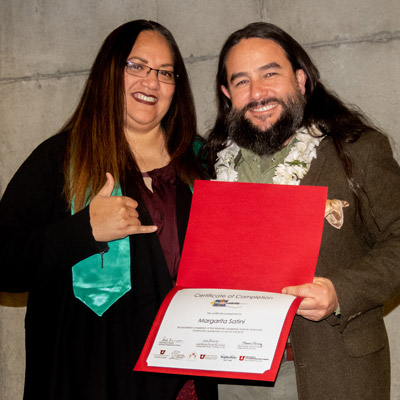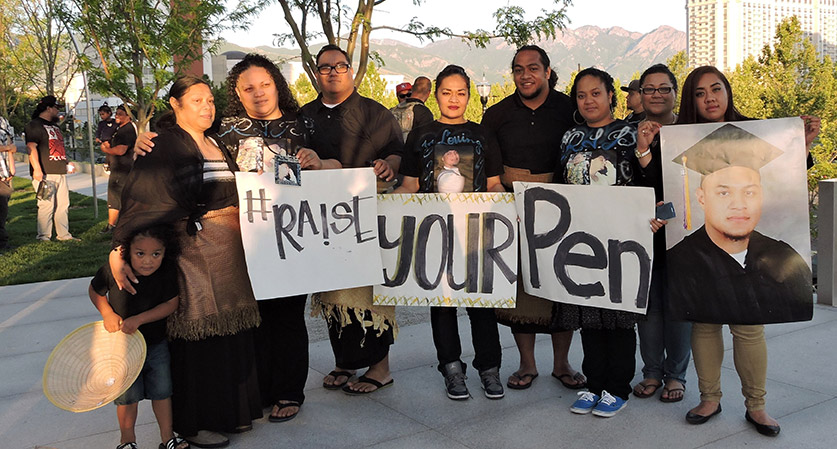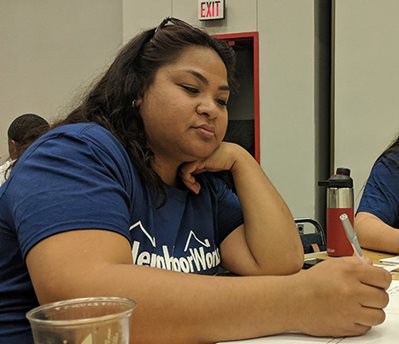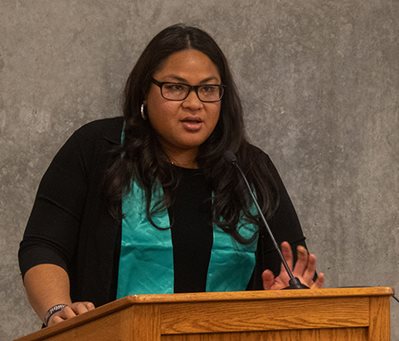Isileli Tausinga says people often wonder: Why leave a beautiful island to come to the desert in Utah? His answer? Education, religion and opportunity.
NeighborWorks Salt Lake, a network organization that works to provide some of those opportunities. "In meeting our mission of neighborhood revitalization through stakeholder engagement, it is critical to identify and involve the diverse voices that make up the neighborhoods we serve so they guide how we can be thoughtful in our strategies and inclusive to effectively respond to community needs," says Maria Garciaz, the organization's CEO.
 Both Isileli, who is Tongan, and his wife, Mona, who is Hawaiian, found opportunity in Salt Lake City on their own. Isileli became Salt Lake City's first Tongan police officer and is now finishing his master's degree while serving as chief of the investigations division in the legal defender's office. Mona received master's degree in public administration with an emphasis on public policy and disability law. They say they see Pacific Islanders in the community who own businesses and work in all sectors of the community. "We see CEOs. We see attorneys and legislators," Mona Tausinga says.
Both Isileli, who is Tongan, and his wife, Mona, who is Hawaiian, found opportunity in Salt Lake City on their own. Isileli became Salt Lake City's first Tongan police officer and is now finishing his master's degree while serving as chief of the investigations division in the legal defender's office. Mona received master's degree in public administration with an emphasis on public policy and disability law. They say they see Pacific Islanders in the community who own businesses and work in all sectors of the community. "We see CEOs. We see attorneys and legislators," Mona Tausinga says.
But they also see people who need help creating opportunities for themselves, which is where organizations like NeighborWorks Salt Lake come in, along with nonprofits and civic coalitions that the Pacific Islanders have started.
"It's been a process to assimilate into the dominant culture here," Isileli Tausinga says. "It's been a difficult adjustment, whether it be weather or language, or culture or systems." He says organizations in Utah, especially NeighborWorks Salt Lake, have created programs to serve marginalized and underserved populations, including his own.
Garciaz of NeighborWorks Salt Lake says part of her job is figuring out the needs of different cultures in her community. One solution? "Bring them to the table."
"We often have a seat at the table," Garciaz says of her 43-year-old organization. "Our job is making sure that the information we learn is passed to the communities and inviting them to the table, too. We have to hold policy makers accountable, to make sure those voices that aren't at the table are invited to the table."
She sees NeighborWorks Salt Lake as a conduit. "When dollars are available from the local government, we try to tap those dollars because we have a better connection to diverse communities than municipalities do." They also have the track record to attract those dollars, she says. But when it comes to finding out what diverse communities, including the Pacific Islander communities, need — especially now, "during the pandemic of health and race" — she looks to the leaders of the communities to see how to best support them. She does not speak for them, she says, but to them.
When the Polynesian community first came to Utah, the culture, say Polynesian leaders, was to be quiet and respectful. Speaking up and advocating for themselves was something they had to learn.
NeighborWorks Salt Lake's Westside Leadership Institute provided some of those learning opportunities. NeighborWorks Salt Lake also brought a group of Pacific Islanders to the NeighborWorks Community Leadership Institute.

"We were very intentional about bringing members of diverse communities to our program," Garciaz says. "One of the issues was always language. We offered one in Spanish. This year, we organized one in the Samoan language."
"It was something we've never done before," says Jasmine Walton, community engagement coordinator at NeighborWorks Salt Lake. "We had the workbook translated into Samoan." She says the class leader was also able to talk about things in the community's own terms: If they hosted a meeting, how would it look?
Margarita Satini, an organizer for the Sierra Club and executive director of the Utah Pacific Islander Civic Engagement Coalition (UPICEC), took courses at the institute. She also taught them. As an advocate, she says, her issues include the census — making sure Pacific Islanders are counted — and voter registration. UPICEC along with sister coalition Utah Pacific Islander Health Coalition, set up a COVID response team as they learned that Pacific Islanders made up a larger percentage of those who contracted — and were hospitalized with — the coronavirus.
 Susi Feltch-Malohifo'ou says her cofounder at Pacific Island Knowledge 2 Action Resources (PIK2AR), a community organization in Salt Lake City, also took classes at the institute, before going back to talk about their organization. Their mission, Feltch-Malohifo'ou says, is to provide the community with culturally relevant education and resources, such as a new directory of Pacific Islander-owned businesses. Other goals are to "perpetuate our art to make sure our youth are grounded in who they are as Pacific Islanders," she says. A big goal is to build alliances like the one they have with NeighborWorks Salt Lake. The partnership helps both organizations expand their reach.
Susi Feltch-Malohifo'ou says her cofounder at Pacific Island Knowledge 2 Action Resources (PIK2AR), a community organization in Salt Lake City, also took classes at the institute, before going back to talk about their organization. Their mission, Feltch-Malohifo'ou says, is to provide the community with culturally relevant education and resources, such as a new directory of Pacific Islander-owned businesses. Other goals are to "perpetuate our art to make sure our youth are grounded in who they are as Pacific Islanders," she says. A big goal is to build alliances like the one they have with NeighborWorks Salt Lake. The partnership helps both organizations expand their reach. Garciaz says that partnerships have been important. "We try to stay connected to the various groups, to make them aware of what we have to offer. We can't do everything, but there are a lot of good organizations out there." Together, she says, they can achieve more.
Walton says they've worked to bring new Utah residents together so they can talk about what they're seeing in their communities and how to collaborate.
"We know our communities," says Feltch-Malohifo'ou. "Let us lead."
The Tausingas say the churches also helps organizations expand their reach, since that is where many Polynesians congregate. The churches are trusted, they say, making it a safer space when it comes to conveying information. The church leaders teach courses in self-reliance and how to build assets. Garciaz says that's something her organization has learned over the years; the church became one of the locations for a home ownership classes. Homeownership is one of the core missions of NeighborWorks Salt Lake. She says they continue to work to help Polynesians obtain homeownership. "That is their first and greatest asset," she says. "It helps them build wealth."
"They don't always realize that home ownership can be a reality for them," Walton says. "We help them through the process — finding out what resources are available and making sure they know about our programs. We're able to say, 'Look, I know it's daunting, but you can do this.'"
Garciaz says that during COVID, when people need to be able to social-distance from one another, the importance of having a safe place to live has become amplified. "It's elevated the conversation to the policy makers, to the legislators," she says. Feltch-Malohifo'ou says COVID "brought to the surface issues that we already knew." She is keeping an eye on next steps. "It's good that we're having these conversations," she says. "But now what?" She remains optimistic that the result "will be something good."
Garciaz says one of the results of both COVID and the fight for racial equity is that diverse communities have been coming together. "We created our own COVID response team," Satini says. "We created resources and we've shared them with everybody. Black, indigenous people of color. If we help these groups, we help everybody." They've rallied around rent relief, too. "The needs we have at the moment are more testing, more community health leaders on the ground, rent and mortgage relief — we just need a lot of relief," Satini says
 Recent census figures showed 40,000 Native Hawaiians and Pacific Islanders in Utah, according to the Utah Department of Health. More than 85 percent of them live in Salt Lake County and Utah County. The Tausingas believe the next census will show even more of an increase. Like Feltch-Malohifo'ou, they believe the art, language and traditions of the islands are important to pass on to the children who are growing up in Utah. "The kids born and raised here, some of them have never been to the islands," Isileli Tausinga says. "That's a way to keep them connected with their roots."
Recent census figures showed 40,000 Native Hawaiians and Pacific Islanders in Utah, according to the Utah Department of Health. More than 85 percent of them live in Salt Lake County and Utah County. The Tausingas believe the next census will show even more of an increase. Like Feltch-Malohifo'ou, they believe the art, language and traditions of the islands are important to pass on to the children who are growing up in Utah. "The kids born and raised here, some of them have never been to the islands," Isileli Tausinga says. "That's a way to keep them connected with their roots."Mona Tausinga says she has been glad to see Pacific Islanders use their voices. "We've seen a lot of young leaders connecting to resources," she says. "In the past, they didn't feel like they had a voice, but wow, they have an incredible voice now and they aren't afraid to keep it up."
Walton and Garciaz shared some of their lessons learned for working with new communities:
- It is important to seek out those not represented in the conversation and invite them to the table, Garciaz says.
- It's also important to let the community members explain the best ways to work with them to get them what they need, says Walton.
- It takes time to build trust and it requires positive action and patience, she adds.

